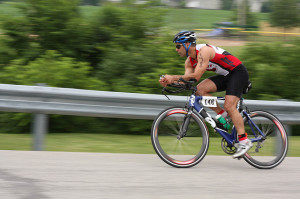 The cycling segment is arguably the most important part of a triathlon race. Sandwiched between swimming and running, cycling is the area where you can make up or lose the most time. The 12.1 mile segment makes up about half of the total time that you will spend in the entire race, so it is important to be prepared.
The cycling segment is arguably the most important part of a triathlon race. Sandwiched between swimming and running, cycling is the area where you can make up or lose the most time. The 12.1 mile segment makes up about half of the total time that you will spend in the entire race, so it is important to be prepared.
Gear
The cycling part of the race requires the most equipment of the three segments. Even for one-time triathletes, it is important to invest in quality gear when competing. Even if that means renting or borrowing gear from others, do not forget to bring the proper gear on race day. The following list is provided by TriathlonCompetitor:
- Cycling shoes – Velcro straps will help you get these on and off, which will speed up your transition time.
- Saddle – Look for support AND comfort when looking into saddles.
- Computer – A basic computer will measure speed, distance, cadence, and the time you’ve been out riding.
- Helmet – Choose a helmet that fits properly and comfortably and that you will feel confident wearing.
- Aerobars – If you’re going to use a road bike for triathlon, aerobars should be one of your first tri-specific purchases.
- Pedals – Clipless pedals firmly connect the rider to the bike and will maximize your pedaling efficiency.
- Cycling kit – A jersey will fit snugly and have pockets to store food or other items, such as a phone, for easy access during a ride.
- Bicycle repair tools – you will not regret this decision when you experience a flat tire during the race.
Mistakes to Avoid
Editor Caitlyn Uttley compiled a list of common beginner triathlete mistakes that you should consider and avoid as you prepare for your first triathlon. Though these mistakes can apply to the other portions of the race, they include cyclist-specific advice. Her list is summarized below:
- Inadequate training – It is vital to train in all three areas and not to assume that because you are good at one you are good at them all. Train all three and combine that training together, simulating race day.
- Overtraining – You don’t want to push too hard in training, or you will be too fatigued make it to race day.
- Not warming up or stretching before the race – Warming up enhances your performance, prevents injuries, and helps you to mentally prepare for the task ahead (source: Bernhardt)
- Not pacing yourself — Remember that the shortest of triathlons can take between one and two hours to complete.
- Not including a good diet in your training regimen. Diet is as important as exercise and technique training.
- Not having the proper clothing – Plan ahead to make sure you’ve got the right clothing for each stage of the race. Practice in the clothing you will compete in.
- Not practicing swimming in open water – There is a difference between lake and pool water.
- Not learning how to fix your bike – If you don’t learn, you can be knocked out of the race.
- Not practicing transitions – It can be difficult transitioning from swimming to cycling to running because the constant motion of cycling can make your legs feel a little wobbly.
Additional source: IntelligentTriathlonTraining
Photo courtesy of: Rob Annis
